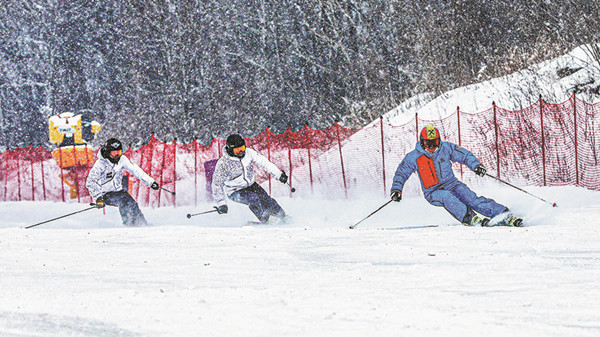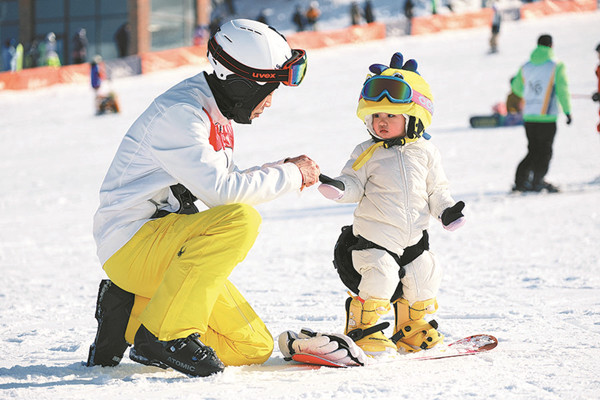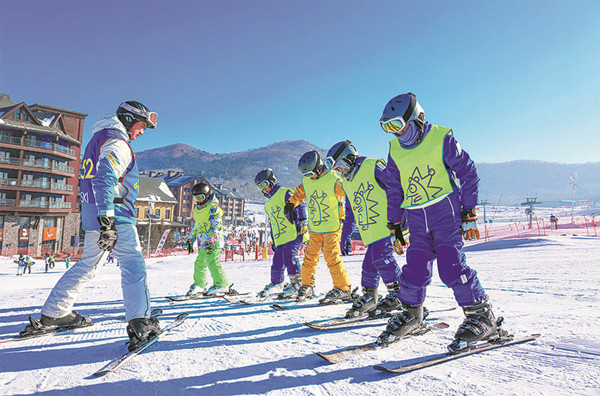
Ski enthusiasts enjoy skiing at Vanke Lake Songhua Resort in Jilin city, Jilin province. [Photo provided to China Daily]
Country's ski hub is investing heavily in promoting icy allure, both at home and abroad, Liu Mingtai and Zhou Huiying report in Changchun.
As the early winter temperatures drop across northeastern China, ski enthusiasts in Jilin province and elsewhere in the country are getting excited as ski lodges in the province begin to open their doors. Among them is Xu Guanghui.
The day the Miaoxiangshan Ski Resort in Changchun opened on Nov 18, the 60-year-old drew plenty of attention as he and his companion for the day — a 20-month-old baby girl — prepared to enjoy the slopes.
"I have waited eight months since the ski season finished in mid-March," he says. "I'm even happier that this winter I can bring my granddaughter here to enjoy the snow."
The toddler shows interest and a degree of talent as she takes to a snowboard for the first time, eliciting applause from the other ski enthusiasts.
"I have been in love with skiing since I retired from the air force and became the Party secretary of a private college," Xu says. "When I learned that the students enjoyed winter sports, especially students from southern regions, I suggested that the college put on more courses and activities. We also took the students to nearby ski resorts to experience winter sports."
Since retiring from the college in 2013, he spends most of his spare time at ski resorts around Changchun, Jilin, in the winter.
"The infrastructure at the resorts has been greatly improved since 2008. Now I can enjoy skiing at international standard resorts," he says. "I plan to take my granddaughter out to practice once or twice a week during this winter. As a child born in the Northeast, she should learn to love the snow and ice."

Xu Guanghui teaches his 20-month-old granddaughter skiing at the Miaoxiangshan Ski Resort in Changchun, Jilin. [PHOTO BY MA NAN/FOR CHINA DAILY]
In recent years, with the improvements to infrastructure and tourism, Jilin's winter tourism sector is taking large strides toward internationalization and toward creating an economic system based on ice and snow.
From skiing to cultural experiences, Jilin is turning its winter resources into a new driving force for economic development.
The province has identified tourism as a 1 trillion yuan pillar industry during the 14th Five-Year Plan (2021-25) period, with winter tourism occupying a significant portion, according to its official paper.
To reach this goal, Jilin has drawn up an action plan to increase its winter tourism revenues to 500 billion yuan ($70 million) within five years.
Located at the same latitude as the Alps and the Rocky Mountains, the Changbai Mountain region is well-known for powdery snow that lasts throughout the winter thanks to consistently frigid temperatures, which also makes Jilin one of China's top ski destinations.

A ski coach gives lesson to tourists at the Songhua Resort. [Photo provided to China Daily]
Currently there are 75 ski resorts and 319 slopes in the province, which are capable of receiving up to 120,000 people a day, making Jilin the country's ski hub, according to the provincial culture and tourism department.
During the last ski season, from November 2022 and March of this year, the province received 56.7 million domestic tourists and made revenues of 100.8 billion yuan. Its 26 key winter tourism businesses received 11.78 million people.
Jilin has the largest ski resorts in China, including Lake Songhua, Beidahu and Wanda White Mountain, and also has foreign instructors teaching skiing and snowboarding.
"To become an international ski resort and attract more visitors from around the world, we began to introduce foreign instructors in 2016," says Li Ji, head of the ski training department at the Beidahu Ski Resort. "Some have been hired from Club Med resorts elsewhere in the world, including France, Canada, Italy and the United Kingdom, and others have been hired directly by the resort."
For this year's season, the resort has expanded to 64 slopes and now covers 240 hectares.
"The international instructors have seen the rapid development of winter sports in China since the 2008 Olympics. We offer good living conditions in the largest ski resort in the country, which they appreciate," he adds.
Max Blouin has begun his fourth winter in Beidahu and has seen great changes to the resort in recent years.
"I was a senior ski instructor in Canada and was employed to teach snowboarding at Beidahu in 2020," he says. "Jilin's ski resorts are developing rapidly, such as the introduction of new snow making equipment and the expansion of the number of slopes, as well as the scale of the hotels.
"China has a large population and more people are interested in skiing," he says. "I believe that China's winter sports sector has very good prospects for development, and that's the reason I'm here."
Blouin adds that he also likes Chinese culture and studied Chinese in Shanghai, and that he hopes to use his experience to help improve the skills of Chinese ski instructors.
Meanwhile, tourist offerings featuring ethnic cultural experiences are maintaining the province's attraction during the summer.
Yanbian, the only ethnic Korean autonomous prefecture in China, has experienced a rapid increase in tourists in search of its ethnic cultural experiences since the beginning of this year.
The Chinese Korean Ethnic Park in Yanji, the prefectural capital, displays all the elements of Korean culture and customs, and attracts many visitors, especially young women, who can experience dressing up as a Korean princess.
Even on chilly winter days, the park still receives over 4,000 visitors a day, many of them from southern China.
Ma Yuying, a visitor from Nanning in the Guangxi Zhuang autonomous region, chose a trip to Yanji as her 24th birthday gift.
"This is my first time to experience winter in the northeast," she says. "I also tried the outdoor hot springs, which were comfortable and relaxing. It has left me with really unforgettable memories".
The provincial government sets aside 100 million yuan a year for the development of its winter tourism sector, and has also introduced a number of preferential policies to help promote it further. And in addition to issuing 30 million yuan in winter tourism vouchers, 10 million yuan in winter transportation subsidies is also being offered to group tourists.
The winter sports sector is being extended and the province will introduce a plan to expand its winter equipment manufacturing businesses, increase the transformation and use of new materials and technologies, and encourage the creation of domestic winter equipment manufacturers and brands, such as those involved in making carbon fiber ski equipment and anti-cutting suits, made from cut (especially against the ice skate blade) resistant clothing.







